As an English teacher, I often encounter the terms “irregardless” and “regardless” in my classes, and I can tell you that this distinction often baffles many learners.
Understanding the difference between these two words can greatly improve one’s grasp of English and lead to more precise and effective communication.
So, if you’ve ever been unsure about which one to use, you’re not alone! Let’s explore the meanings, definitions, and usage of these two words together.
“Irregardless” and “regardless” are terms that often confuse. However, “irregardless” is widely considered nonstandard English.
Recognizing the correct usage of “regardless” over “irregardless” can prevent common mistakes and enhance the clarity of your writing and speaking.
By the end of this exploration, you will feel more confident in your ability to choose the appropriate term in various contexts.
You might also enjoy: Top 100 Commonly Used Verbs That Start With A [2024]
Here are 40 differences between the two:
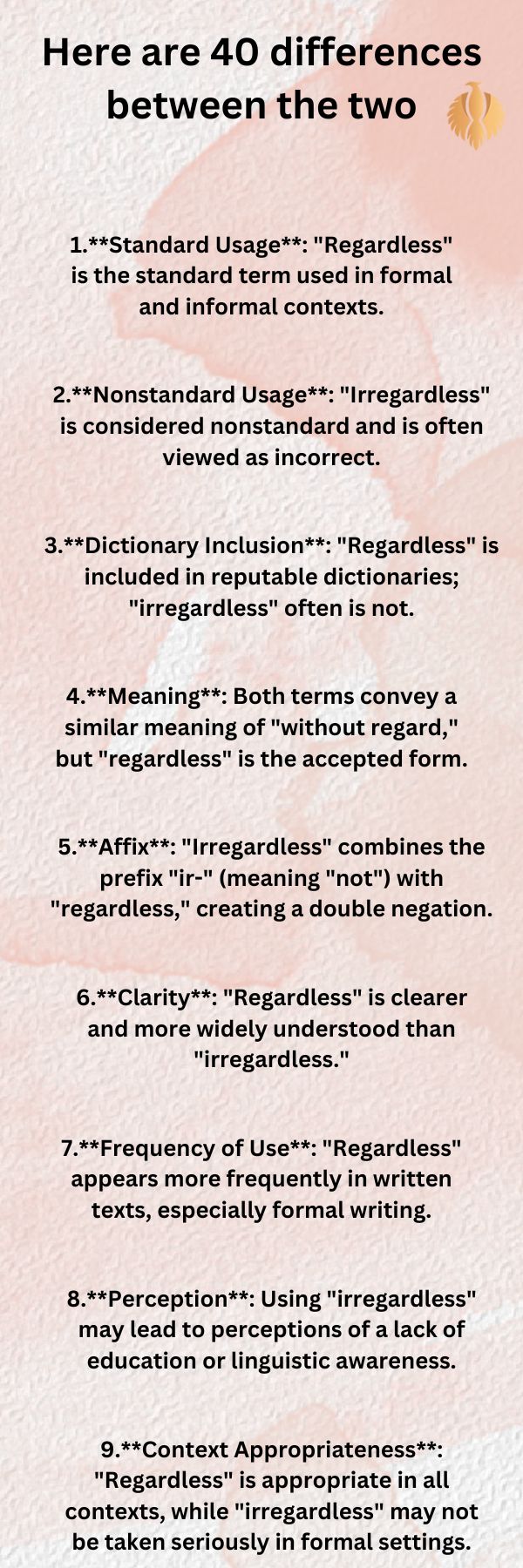
- **Standard Usage**: “Regardless” is the standard term used in formal and informal contexts.
- **Nonstandard Usage**: “Irregardless” is considered nonstandard and is often viewed as incorrect.
- **Dictionary Inclusion**: “Regardless” is included in reputable dictionaries; “irregardless” often is not.
- **Meaning**: Both terms convey a similar meaning of “without regard,” but “regardless” is the accepted form.
- **Affix**: “Irregardless” combines the prefix “ir-” (meaning “not”) with “regardless,” creating a double negation.
- **Clarity**: “Regardless” is clearer and more widely understood than “irregardless.”
- **Frequency of Use**: “Regardless” appears more frequently in written texts, especially formal writing.
- **Perception**: Using “irregardless” may lead to perceptions of a lack of education or linguistic awareness.
- **Context Appropriateness**: “Regardless” is appropriate in all contexts, while “irregardless” may not be taken seriously in formal settings.
- **Popularity**: “Regardless” is the more popular choice among educated speakers and writers.
- **Grammar Acceptance**: Many grammar experts and linguists critique “irregardless” for its nonstandard nature.
- **Formal Writing**: “Regardless” is preferred in academic and professional writing; “irregardless” should be avoided.
- **Variation in Audience Reaction**: “Regardless” is generally accepted by all audiences; “irregardless” may create backlash.
- **Usage in Media**: “Regardless” is the term used by reputable news outlets; “irregardless” is mostly found in casual speech.
- **Register**: “Regardless” fits both formal and informal registers; “irregardless” is more informal and often criticized.
- **Historical Origin**: “Regardless” has been used since the 19th century; “irregardless” emerged later as a colloquialism.
- **Colloquial Usage**: “Irregardless” may be used in some regional dialects but is still not standard.
- **Synonyms**: The word “regardless” can be substituted with synonyms like “nonetheless” or “nevertheless,” while “irregardless” typically has no informal synonyms.
- **Impact on Writing**: Using “irregardless” can diminish the perceived quality of writing; “regardless” enhances it.
- **Usage in Speech**: “Regardlessly” is a rare alternative to “regardless” but still does not exist in formal English.
- **Linguistic Evolution**: “Irregardless” may reflect how language evolves, but it remains a point of contention.
- **Phonetics**: “Irregardless” has an extra syllable, making it slightly longer to pronounce.
- **Pronunciation**: Both terms are pronounced similarly, creating confusion despite differing acceptability.
- **Word Formation**: “Irregardless” is an example of a blend that has become popular despite grammatical flaws.
- **Cultural Acceptance**: “Regardless” has cultural acceptance across language communities; “irregardless” is not widely accepted.
- **Avoidance in Education**: English teachers often discourage the use of “irregardless” in writing and speech.
- **Use in Literature**: “Regardless” can be found in literary works, whereas “irregardless” almost never appears.
- **Etymology**: “Regardless” stems from the adjective “regard” with the suffix “-less,” while “irregardless” combines two negations.
- **Influence of Dialects**: Variations in dialects may incorporate “irregardless” more frequently but still deemed incorrect.
- **Use in Quotes**: Quoting someone using “irregardless” may undermine credibility; “regardless” retains it.
- **Formal vs. Informal**: “Regardless” fits formal discussions, while “irregardless” is more suited to informal or humorous contexts.
- **Proliferation in Pop Culture**: “Irregardless” has gained attention in pop culture and humor, often highlighting its incorrectness.
- **Language Precision**: “Regardless” conveys precise meaning; “irregardless” may confuse listeners.
- **Influence of Social Media**: The internet has popularized “irregardless,” though it’s often criticized in comments.
- **Correcting Errors**: Spell checkers often flag “irregardless,” but they do not flag “regardless.”
- **Professional Settings**: Use of “irregardless” in business communications can be unprofessional; “regardless” is expected.
- **Consulting Experts**: Language experts clarify that “regardless” is the correct term, while “irregardless” is discouraged.
- **Public Speaking**: Speakers are advised to use “regardless” to maintain authority and credibility in their messages.
- **Comedic Use**: “Irregardless” can be used humorously, often to highlight a misunderstanding of language conventions.
- **Legacy**: “Regardless” is likely to continue being used appropriately; “irregardless” may ultimately fade from standard usage.
These differences highlight the importance of adhering to standard English practices while acknowledging language evolution and common misconceptions.
You might also enjoy: Top 30 Gambling Phrases and Idioms In 2024
Understanding “Regardless”
In my classes, I explain that “regardless” is the correct term that means “without regard” or “despite anything to the contrary.” It expresses that something will happen irrespective of the circumstances.
For instance, you might say, “Regardless of the weather, we will go for a hike.” Here, it emphasizes that the weather won’t affect the decision.
“Regardless” is a term widely used in the English language to convey the idea of not being affected or influenced by something, often signifying that one will proceed with a particular action or belief despite any obstacles, challenges, or differing opinions.
This adverb serves to assert an unwavering stance, allowing speakers and writers to express determination or clarity in their intentions.
For instance, when someone says, “I will attend the meeting regardless of the weather,” they emphasize their commitment to being present despite potential adverse conditions.
The term can also function to highlight the irrelevance of previous points in a discussion; for instance, “Regardless of your objections, we must move forward with the plan.” This utility makes “regardless” a powerful tool in both informal conversation and formal writing, as it communicates a strong message of resolve.
Moreover, understanding the term’s correct usage is crucial for effective communication, as it reinforces the importance of clarity and precision in language.
Despite common misconceptions and the frequent misuse of the term “irregardless,” which is often viewed as nonstandard and grammatically incorrect, “regardless” remains the appropriate choice and is universally accepted across various contexts.
Its roots can be traced back to the combination of “regard” and the suffix “-less,” which together convey the absence of consideration or concern for something.
As our language continues to evolve, the relevance of “regardless” endures, making it an essential part of articulating thoughts and opinions with conviction, thereby fostering clear understanding and meaningful interactions in both personal and professional environments.
30 Examples of sentences using the word “regardless”

- She decided to go for a run regardless of the rain.
- He will continue his research project regardless of the obstacles he faces.
- Regardless of what others think, I believe in my decision.
- The concert will take place outdoors, regardless of the weather conditions.
- She is determined to finish her degree regardless of any setbacks.
- Regardless of age, everyone is welcome to join the community center activities.
- He promised to support her regardless of the challenges ahead.
- We will proceed with the plans regardless of the limited budget.
- Regardless of your opinion, the law must be followed.
- She maintained her positive attitude regardless of the criticism.
- The team played hard regardless of the score.
- Regardless of the time it takes, I will learn to play the piano.
- He moved forward with his career plans regardless of doubts from his friends.
- She continued to smile regardless of the difficult situation.
- Regardless of the risks, they decided to invest in the new startup.
- The meeting will happen at 9 AM regardless of who can attend.
- He wore his favorite shirt regardless of the fashion trends.
- Regardless of the outcome, they were proud of their efforts.
- She stood by her friend regardless of the gossip circulating.
- The project will be completed on time, regardless of the challenges.
- He went hiking regardless of the warnings about the rough trail.
- Regardless of reputation, she pursued her dreams with passion.
- They will attend the wedding regardless of their busy schedules.
- She chose the career path she loved regardless of the potential salary.
- Regardless of difficulties, he always finds a solution to problems.
- The event was a success, regardless of the last-minute changes.
- Regardless of the predictions, the team is focused on winning.
- She kept reading the book regardless of the distractions around her.
- The children played outside regardless of the cold breeze.
- Regardless of the competition, he believes in his unique approach.
These examples illustrate how “regardless” can be effectively used in various contexts to denote determination, resilience, and the prioritization of one’s own beliefs or actions over external factors.
You might also enjoy: Which of the Following: Definition + Complete Usage + Grammar
The Myth of “Irregardless”
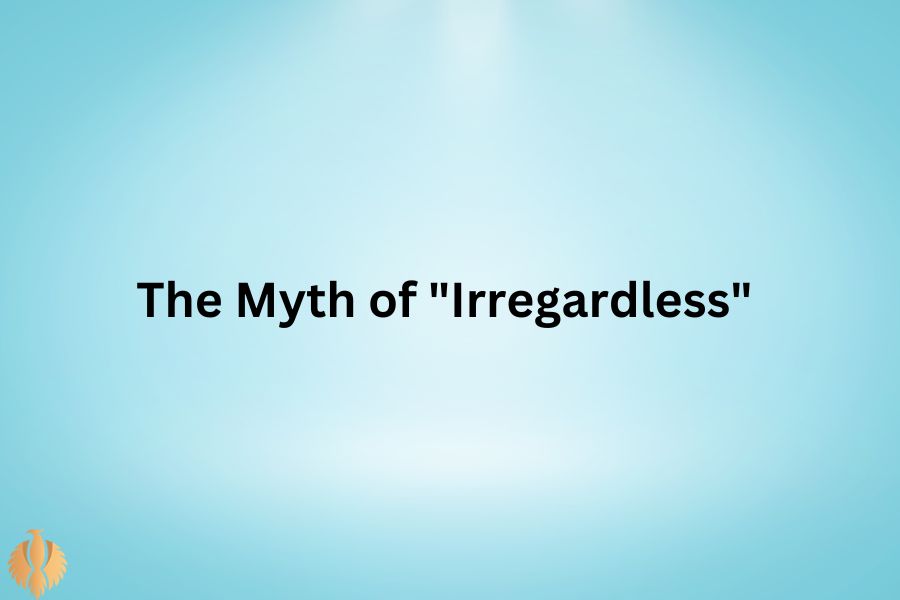
Now, the term “irregardless” is often mistakenly used in place of “regardless.” However, it’s important to note that “irregardless” is considered nonstandard and is not recognized as correct in formal English.
While some people use it to convey the same meaning as “regardless,” it can be seen as incorrect. A common phrase might be, “Irregardless of the consequences, I will speak my mind.” Remember, it’s better to stick with “regardless” in writing and speech!
The term “irregardless” has become a common point of contention in discussions about English usage, often misunderstood and misapplied in both spoken and written communication.
Many people mistakenly believe that it is a correct alternative to the word “regardless,” yet this belief is grounded more in colloquial usage than in established linguistic convention.
The root of the term combines “ir-” (a prefix denoting negation) and “regard,” alongside the suffix “-less,” which implies a lack of consideration; thus, its construction suggests a double negation that inherently contradicts itself.
Language experts and grammarians widely agree that “regardless” is the proper term to convey the intended meaning of being unaffected by something.
Despite its frequent incorrect use, “irregardless” persists in various dialects and informal settings, often indicative of linguistic evolution where nonstandard forms gain traction in everyday discourse.
This phenomenon raises interesting questions about the nature of language, as it is not static but rather fluid and reflective of cultural shifts.
Still, the ongoing use of “irregardless” can hinder clear communication, particularly in formal contexts where precision is critical.
As such, understanding the nuances of word choice and adhering to established language conventions can not only enhance clarity but also empower individuals to convey their thoughts effectively.
Emphasizing “regardless” over its erroneous counterpart helps preserve the integrity of the language while acknowledging the complexities associated with its evolution and usage in different social contexts.
30 Examples of sentences using the word ” Irregardless” 
- Irregardless of the weather, we plan to have the picnic outdoors.
- She decided to go to the concert irregardless of the late hour.
- Irregardless of what he said, I still believe we should move forward.
- They chose to travel irregardless of the high costs involved.
- Irregardless of my previous mistakes, I am determined to succeed this time.
- He wore his favorite jacket irregardless of the fashion rules.
- Irregardless of the team’s performance, the fans remained supportive.
- She kept painting irregardless of the fact that it was getting dark.
- Irregardless of the risks, they decided to climb the mountain.
- He will help you irregardless of the busy schedule he has.
- Irregardless of their differences, they managed to work together.
- She finished the marathon irregardless of her injury.
- Irregardless of the warning signs, they ventured into the forest.
- He spoke his mind irregardless of the potential backlash.
- Irregardless of the rules, they had a great time at the party.
- The appointment will happen irregardless of whether I can make it.
- Irregardless of the challenges, they remained committed to their goals.
- She sang confidently irregardless of her nerves.
- Irregardless of the advice given, he chose his own path.
- They decided to celebrate irregardless of the uncertainties ahead.
- Irregardless of the budget constraints, the project moved forward.
- She kept smiling irregardless of the tough situation she faced.
- Irregardless of the deadline, he wanted to do the job well.
- They danced at the wedding irregardless of their lack of experience.
- Irregardless of her fear, she took the stage that night.
- He continued to write irregardless of the criticism he received.
- Irregardless of the weather forecast, we went hiking.
- She made the decision irregardless of the consequences.
- Irregardless of the late hour, they stayed up to finish the work.
- He met his deadlines irregardless of his busy schedule.
Remember that while “irregardless” is often used in informal conversation, “regardless” is the appropriate term in standard English.
You might also enjoy: To Bad Or Too Bad – Correct Grammar + Examples [2024]
Here are 40 points highlighting the differences, usage, and considerations of “irregardless” versus “regardless” in writing:
Definitions and Usage
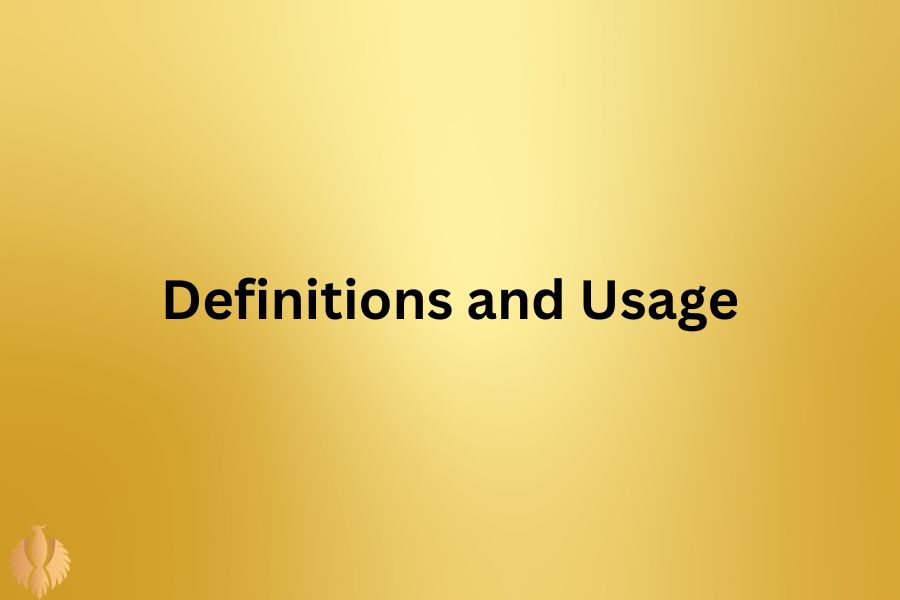
- **Correct Usage**: “Regardless” is the standard term meaning “without regard” or “in spite of.”
- **Nonstandard Usage**: “Irregardless” is considered nonstandard and often seen as a mistake.
- **Double Negation**: “Irregardless” combines “ir-” and “-less,” which creates a double negative that contradicts itself.
- **Accepted Usage**: “Regardless” is accepted in both written and spoken English across various contexts.
- **Informal Acceptance**: “Irregardless” may be used in informal contexts, but it is still viewed as incorrect by most linguists.
Context and Clarity
- **Formal Writing**: Always use “regardless” in formal writing, such as academic papers or professional reports.
- **Informal Conversations**: “Irregardless” might be heard in casual conversation but is best avoided in presentations.
- **Clarity of Communication**: Using “regardless” helps maintain clear and precise communication.
- **Audience Perception**: Using “irregardless” can lead to misunderstandings or negatively impact the writer’s credibility.
Stylistic Considerations
- **Voice and Tone**: “Regardless” projects a more professional tone, suitable for serious discussions.
- **Regional Variations**: Some regions may use “irregardless” more frequently, yet it remains grammatically incorrect.
- **Cultural Nuances**: Be mindful of cultural contexts; certain audiences may accept informal language.
- **Editing and Proofreading**: Always double-check for the usage of “regardless” in drafts to avoid errors.
Linguistic Evolution
- **Language Evolution**: Language is constantly evolving; however, certain established rules still apply.
- **Dictionaries**: “Regardless” is listed in standard dictionaries; “irregardless” appears primarily in informal contexts or as an entry indicating its misuse.
- **Generational Differences**: Younger generations may use “irregardless” more often, but it’s still considered incorrect by language authorities.
Examples in Writing

- **Correct Example**: “We will proceed with the plan, regardless of the challenges.”
- **Incorrect Example**: “We will proceed with the plan, irregardless of the challenges.”
- **Usage in Titles**: Use “regardless” in titles of formal papers or articles to convey authority.
- **Professional Communications**: Use “regardless” in emails, reports, and resumes for a polished impression.
Grammar and Syntax
- **Proper Structure**: “Regardless” fits seamlessly into sentences without altering grammatical structure.
- **Misleading Constructs**: “Irregardless” can confuse sentence structure due to its contradictory nature.
Teaching and Learning
- **Teaching Moment**: Highlight the difference in classes to improve understanding of standard English.
- **Encouraging Literacy**: Foster a habit of using “regardless” to enhance writing skills.
Personal Preference
- **Writers’ Style**: Some writers may prefer “regardless” for its clarity and adherence to rules.
- **Personal Voice**: Choosing “regardless” can reflect a writer’s commitment to standard language conventions.
Consequences of Usage
- **Professional Reputation**: Misusing “irregardless” might damage a writer’s professional reputation.
- **Peer Feedback**: Writers may receive feedback if they use “irregardless” in professional settings.
Alternatives and Variants
- **Synonyms**: Consider synonyms like “notwithstanding” or “in any case” to avoid confusion.
- **Clarifying Intent**: “Regardless” clarifies intent more effectively than “irregardless.”
Cognitive Associations

- **Cognitive Load**: Using “regardless” reduces cognitive load for the reader, ensuring smoother comprehension.
- **Avoiding Confusion**: Readers may be distracted or confused by nonstandard terms like “irregardless.”
Encouraging Correct Usage
- **Promoting Awareness**: Encourage others to use “regardless” to maintain language standards.
- **Revising Incorrect Usage**: When editing, suggest reverting “irregardless” to “regardless” for correctness.
You Might Also Enjoy: How To Learn English Speaking At Home: My 12 Tips
Summary of Differences
- **Consensus in Academia**: Academic institutions emphasize the importance of using “regardless.”
- **Public Perception**: “Irregardless” may be viewed as an example of poor language skills by the public.
Final Thoughts
- **Adhering to Standards**: Sticking to “regardless” upholds linguistic standards in communication.
- **Personal Accountability**: Writers should take responsibility for their word choices in all forms.
- **Strengthening Writing**: Using “regardless” strengthens arguments and statements through precision.
- **Broader Implications**: Observing word usage reflects one’s understanding and respect for the language.
In summary, it is essential to prioritize “regardless” in both spoken and written English to convey ideas clearly and maintain a professional standard.
Here are 40 points highlighting the differences, usage, and considerations of “irregardless” versus “regardless” in grammer:
Definitions and Basic Differences
- **Definition of Regardless**: “Regardless” means without regard or despite the circumstances.
- **Definition of Irregardless**: “Irregardless” is a nonstandard term often mistakenly used in place of “regardless.”
Grammar and Acceptability
- **Standard Usage**: “Regardless” is the standard and accepted term in both spoken and written English.
- **Nonstandard Usage**: “Irregardless” is widely considered a grammatical error and is nonstandard.
Linguistic Perception
- **Perception by Linguists**: Linguists label “irregardless” as incorrect due to its redundancy.
- **Social Acceptance**: Some people use “irregardless,” but it is often viewed as informal or uneducated.
Word Structure
- **Double Negative Concept**: “Irregardless” combines the prefixes “ir-” and “-less,” creating a double negative.
- **Simplicity and Clarity**: “Regardless” is simpler and clearer without the confusing construction.
Usage Contexts

- **Formal Settings**: “Regardless” is appropriate for formal writing and professional communication.
- **Informal Settings**: “Irregardless” may be used informally but is still seen as incorrect.
Writing Best Practices
- **Preferred in Academia**: “Regardless” is favored in academic writing for its correctness.
- **Classroom Teaching**: Educators teach “regardless” to emphasize proper grammar.
Audience Reactions
- **Professional Perception**: Using “regardless” enhances credibility in professional environments.
- **Peer Feedback**: An audience may respond negatively to “irregardless,” impacting the speaker’s credibility.
Clarity of Communication
- **Clear Intent**: “Regardless” expresses intent clearly, avoiding potential confusion.
- **Ambiguity of Irregardless**: The use of “irregardless” can create misunderstanding or confusion.
Common Misconceptions
- **Misunderstanding of Terms**: Many may assume “irregardless” is simply another variant of “regardless.”
- **Influence of Dialects**: Some dialects may accept “irregardless,” but it is not standardized English.
Language Evolution
- **Language Dynamics**: Language evolves, but established norms still hold importance for effective communication.
- **Diction Variations**: “Regardless” is consistently preferred in common dictionaries; “irregardless” may show up as a noted error.
Grammatical Structure
- **Correct Use in Sentences**: “Regardless of the consequences, we move forward.”
- **Incorrect Use in Sentences**: “Irregardless of the consequences, we move forward.”
Teaching and Learning

- **Educational Focus**: Grammar lessons emphasize “regardless” to provide students with correct usage.
- **Promoting Literacy**: Encouraging correct terms aids in improving overall language literacy.
Writing Style
- **Professional Tone**: “Regardless” maintains a formal tone suitable for academic and professional contexts.
- **Casual vs. Formal**: “Irregardless” may be perceived as more casual or colloquial.
Synonyms and Alternatives
- **Substitutes for Clarity**: Instead of “irregardless,” use terms like “notwithstanding” or “in any case” for clarity.
- **Reinforcing Language Skills**: Select alternatives that uphold the standards of language for better expression.
Audience Considerations
- **Tailoring Language**: Choose “regardless” to suit a wider audience familiar with standard English.
- **Regional Differences**: Some regions may be more lenient with “irregardless,” but its correctness remains contested.
Consequences of Incorrect Usage
- **Impact on Reputation**: Incorrect usage of “irregardless” may negatively affect how others perceive a speaker or writer’s abilities.
- **Expert Conversations**: Experts in any field are expected to use grammatically correct terms to establish authority.
Evolving Language
- **Usage Trends**: Despite informal usage trends, “regardless” remains the accepted norm.
- **Generational Variability**: Younger generations may use “irregardless,” but adherence to traditional norms is critical in professional communication.
You might also enjoy: Top 100 Commonly Used Verbs That Start With D [2024]
Future of Language

- **Ongoing Discussions**: Linguists continue to discuss and debate the implications of terms like “irregardless.”
- **Language Evolution**: While language evolves, certain usages may be advocated against for clarity and professionalism.
- **Best Practices**: Always choose “regardless” to conform with standard grammar rules.
- **Final Word Choice**: The choice between the two words affects clarity and perception of authority in communication.
- **Consistency is Key**: Maintaining consistency with “regardless” ensures effective and standard communication.
- **Setting Expectations**: Establishing expectations around the use of “regardless” helps improve language use in various contexts.
In summary, “regardless” is the correct and preferred term, while “irregardless” is considered a nonstandard variant that may lead to confusion and misunderstandings.
### 1. What is the definition of “regardless,” and how is it used in a sentence?
“Regardless” is an adverb that means “without paying attention to the present situation; despite the prevailing circumstances.” It is used to indicate that something will happen or is true without considering any conditions or restrictions.
For instance, in the sentence, “Regardless of the weather, the event will proceed as planned,” the speaker emphasizes that the event will happen no matter what the weather conditions may be.
### 2. Why is “irregardless” considered a nonstandard term?
“Irregardless” is considered nonstandard because it is formed by combining the prefix “ir-” (meaning “not”) with the suffix “-less” (indicating “without”).
This results in a double negative, which can create confusion and weaken the intended meaning. Linguists and grammarians agree that the correct term is “regardless,” which conveys the intended message without the redundancy and complexity of “irregardless.”
### 3. How has the usage of “irregardless” evolved over time?
The usage of “irregardless” has evolved through informal speech rather than formal writing. It likely emerged as a blend of “irrespective” and “regardless,” with speakers wanting to emphasize the idea of ignoring the circumstances.
Although some people use it in casual conversation, it remains contentious among language experts, and most style guides still advocate for the use of “regardless” to maintain clarity and adherence to grammatical rules.
### 4. Can “irregardless” be found in any reputable dictionaries?
Many reputable dictionaries, including the Oxford English Dictionary, include “irregardless” as an entry but often label it as nonstandard or informal. These dictionaries may acknowledge that it is widely used in some regions or communities, but they still emphasize that “regardless” is the preferred and correct form.
This highlights the tension between language change and adherence to grammatical norms.
### 5. What are some common misconceptions about the term “irregardless”?
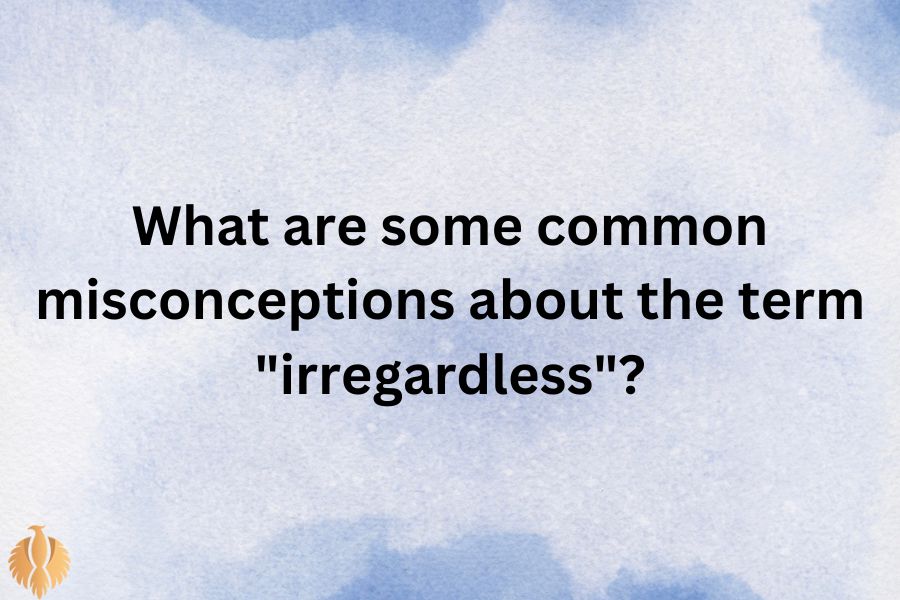
One common misconception is that “irregardless” is simply a synonym for “regardless,” often thought to be just another variation of the word.
Another misconception is that it is acceptable in formal writing or communication, which is not the case. Additionally, some users believe that “irregardless” adds emphasis to their statements when, in reality, it introduces ambiguity and confusion.
### 6. What context is appropriate for using “regardless”?
In professional writing, academic papers, and public speeches, it maintains a level of clarity and respect for standard language conventions.
For example, in a business meeting, one might say, “Regardless of our differences, we must work together to achieve our goals.” Such usage reinforces professionalism and effective communication between all parties involved.
### 7. How does the redundancy in “irregardless” affect its perceived meaning?
The redundancy in “irregardless” can obscure its meaning and lead to misunderstandings. By combining “ir-” (not) with “-less” (without), the term suggests contradicting ideas.
This confusion may cause listeners or readers to misinterpret the speaker’s intent. For instance, someone might mistakenly believe that the speaker is emphasizing a point when, in fact, the expression is inherently contradictory.
### 8. Are there regional differences in the usage of “irregardless”?
Yes, there are regional differences in the usage of “irregardless.” In some areas, particularly in informal speech, people might use “irregardless” without signaling that it’s incorrect.
However, standard English speakers and those in professional settings typically reject it in favor of “regardless.” These regional variations reflect broader differences in language attitudes and perceptions of grammar and correctness.
### 9. How do language experts generally view “irregardless”?
Language experts generally view “irregardless” as an incorrect term. While they recognize that it is used by some speakers, they stress the importance of maintaining standard grammar rules for clarity and effective communication.
Experts advocate for the use of “regardless” to ensure the speaker’s message is conveyed without ambiguity and aligns with accepted language norms.
### 10. What challenges do teachers face when addressing the term “irregardless” in the classroom?
Teachers often face challenges when addressing “irregardless” because many students might have heard or used the term in casual conversations and may not understand its incorrectness.
They need to explain the mechanics of grammar, the significance of standard language, and the potential confusion caused by using nonstandard terms. Finding a way to correct misconceptions without discouraging students from engaging in language use poses additional challenges.
### 11. Can “regardless” be effectively replaced with other synonyms?
Yes, “regardless” can be replaced with several synonyms in certain contexts, such as “notwithstanding,” “irrespective of,” or “in any case.” However, choosing an alternative should depend on the specific context and desired emphasis. For example, while “notwithstanding” may be more formal, “in any case” is more conversational.
It’s crucial to select words that maintain the intended meaning and fit appropriately within the sentence structure.
###12. What effects can using “irregardless” have on a writer’s credibility?

Using “irregardless” can negatively affect a writer’s credibility, particularly in formal or academic writing. Readers or professionals might view the writer as lacking knowledge of standard grammar and conventions, which could undermine their authority in the subject matter.
Such perceptions may discourage audiences from taking the writer seriously or following their arguments, emphasizing the importance of correct word usage in effective communication.
### 13. Are there any specific examples of how “regardless” can enhance clarity in writing?
“Regardless” can enhance clarity in writing by eliminating ambiguity and redundancy. For example, in a legal document, a clause stating, “All parties must comply with the regulations regardless of personal circumstances,” conveys a clear obligation.
If a writer were to say, “All parties must comply with the regulations irregardless of personal circumstances,” it could create confusion about the meaning and detract from the professionalism expected in legal writing.
### 14. How do informal language trends influence perceptions of “irregardless”?
Informal language trends can influence perceptions of “irregardless” by normalizing its use among certain communities or age groups. The rise of social media and informal communication allows nonstandard terms to be disseminated widely, leading some to view them as acceptable.
However, while informal settings may embrace such language, professional and academic contexts still necessitate adherence to standard grammar, highlighting the importance of context in language use.
### 15. How does the choice between “irregardless” and “regardless” reflect a speaker’s education or awareness of language norms?
The choice between “irregardless” and “regardless” often reflects a speaker’s education, grammar awareness, and familiarity with language conventions.
Those who prioritize clarity and adherence to standard English are more likely to choose “regardless,” while those who use “irregardless” may not be aware of its nonstandard status. This choice can signal the speaker’s respect for language norms and their commitment to effective communication.
You Might Also Enjoy: Top 60 Most Common Simple Sentences In English
### 16. Can “regardless” be used in both spoken and written contexts, and how does its usage differ?
Yes, “regardless” can be used in both spoken and written contexts. In spoken language, it can convey a sense of informality and directness, while in written language, it is essential for maintaining clarity and professionalism.
### 17. What role does peer influence play in the use of “irregardless”?
Peer influence plays a significant role in the use of “irregardless,” particularly among younger speakers. In informal settings, if peers frequently use “irregardless,” individuals may adopt it into their speech without critically examining its correctness.
Conversely, if a person is part of a group that emphasizes proper grammar, they may be more likely to use “regardless.” This dynamic illustrates how social interactions can shape language use and reinforce perceptions about grammar and standards.
### 18. How might frequent exposure to “irregardless” impact language learners?
Frequent exposure to “irregardless” can negatively impact language learners by introducing confusion and grammatical errors into their speech and writing. If learners hear or read the term used casually, they may adopt it as part of their vocabulary, leading to the integration of nonstandard expressions into their language skills.
Educators must actively correct this assumption and promote the use of “regardless” to help learners develop a strong foundation in correct English usage.
### 19. What techniques can educators use to address the use of “irregardless”?
Educators can employ various techniques to address the use of “irregardless,” including providing clear explanations of the grammatical reasoning behind preferring “regardless.” They can present engaging activities, such as sentence correction exercises or discussions on language evolution, to highlight the importance of standard language use.
Additionally, incorporating the term into lessons on colloquial language may facilitate a more engaging learning environment where students can grasp the subtleties of English confidently.
### 20. In what ways does the discussion of “irregardless” illustrate broader themes in language and communication?
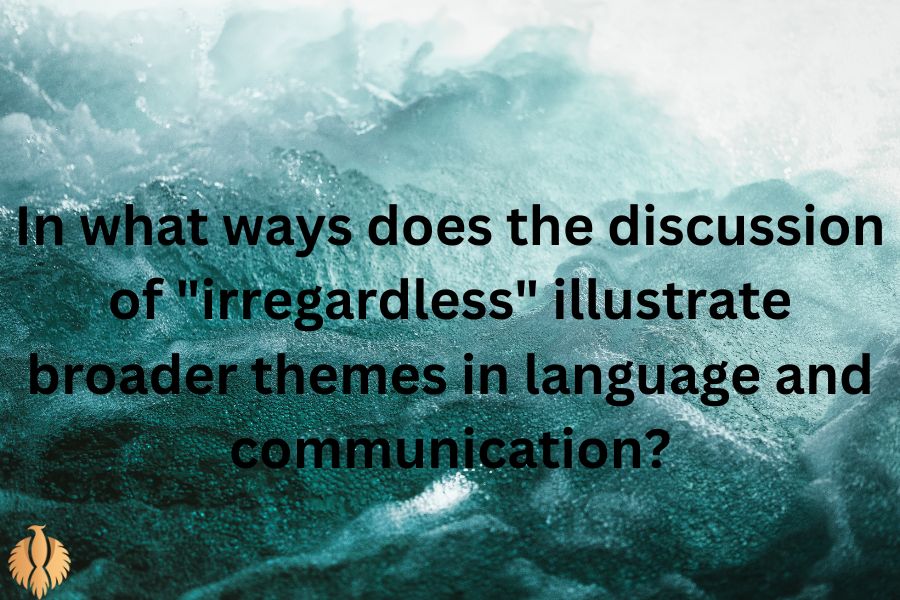
The discussion of “irregardless” illustrates broader themes in language and communication, including the dynamic nature of language, the role of societal norms, and the importance of clarity in communication. It reflects how informal language can challenge traditional standards while also emphasizing the need for effective and precise language use in professional and academic contexts.
Additionally, this debate highlights the tension between the evolution and preservation in language, demonstrating how societal attitudes can shape our understanding of correct usage over time.
These questions and answers provide a comprehensive exploration of the usage, perceptions, and implications surrounding “regardless” and “irregardless.”
Your Thoughts?
Have you ever used “irregardless,” or have you encountered it in conversation? I’d love to hear your experiences! Sharing can help us learn together, and I’m here to support you on your journey to mastering English. Let’s discuss it further in class!

Hi, welcome to my blog! My name is Omid and I am thrilled to have you here! I am an English language teacher with 12 years of experience and hold multiple international certifications (TESOL, IELTS, TOEFL, PTE, CELTA). Additionally, I hold a PhD in Applied Linguistics with a specialization in Teaching English as a Second Language (TESL), which fuels my passion for teaching English and assisting others in mastering the language. To me, nothing is more rewarding than helping individuals enhance their English language abilities through various methods. So, let’s embark on this journey of learning English together.

![a featured image Irregardless vs Regardless: Meaning, Definition & Examples [2024]](https://phoenixenglishlang.com/wp-content/uploads/2024/10/Here-are-40-differences-between-the-two.jpg)


